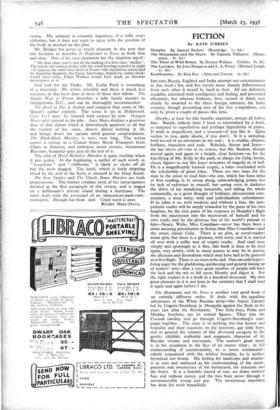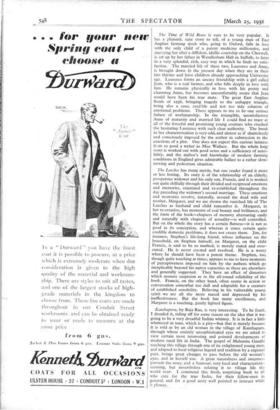FICTION
By KATE O'BRIEN Murphy. By Samuel Beckett. (Routledge. 7s. 6d.) 75. 6d.) - Kanthapura. By Raja Rao. (Allen and Unwire. 7s. 6d.)
IRELAND, Russia, England and India attempt our entertainment in this week's list, and five novels more sharply differentiated from each other it would be hard to find. All are definitely readable, informed with intelligence and feeling, and presented efficiently, but whereas honours, first, second or third, may clearly be awarded to the three foreign entrants, the home country, though presenting two of the five competitors, can only be given a couple of passes this time.
Murphy, at least for this humble examiner, sweeps all before him. Rarely, indeed, have I been so entertained by a book, so tempted to superlatives and perhaps hyperboles of praise. It truly is magnificent and a treasure—if you like it. Quite useless to you, quite idiotic, if you don't. It is a sweeping, bold record of an adventure in the soul ; it is erudite, allusive, brilliant, impudent and rude. Rabelais, Sterne and Joyce— the last above all—stir in its echoes, but Mr. Beckett, though moved again and again to a bright, clear lyricism—as for the kite-flying of Mr. Kelly in the park, or always for Celia, lovely, classic figure—is not like Joyce evocative of tragedy or of hell. He is a magnificently learned sceptic, a joker overloaded with the scholarship of great jokes. There are two ways for the man in the street to read him—the one, which has been mine at first reading, is to sweep along, acknowledging points lost by lack of reference in oneself, but seeing even in darkness the skirts of his tantalising innuendo, and taking the whole contentedly, as a great &aught of brilliant, idiosyncratic com- mentary, a most witty, wild and individualistic refreshment. If he takes, it so, with modesty and without a fuss, the sym- pathetic reader will be amply rewarded by the gusts of his own laughter, by the rich peace of his response to Murphy's flight from the macrocosm into the microcosm of himself and his own truth, and by the glorious fun of his world's pursuit of him—Neary, Wylie, Miss CcninillAn—never has there been a more amusing presentation in fiction than Miss Counihan—and the sweet, classic Celia. There is no plot, as novel-readers mean plot, but there is a glorious, wild story, and it is starred all over with a milky way of sceptic truths. And read once simply and sportingly as it flies, this book is then to be read again, very slowly, with as many pauses as may be to pursue the allusions and decorations which may have had to be gudsed at in first flight. There is no more to be said. One can only hope— being eager for the gladdening, quickening and general toning up of readers' wits—that a very great number of people will have the luck and the wit to fall upon Murphy and digest it. For the right readers it is a book in a hundred thousand. My own great pleasure in it is not least in the certainty that I shall read it again and again before I die.
The Mountains and the Stars is another very good book of an entirely different order. It deals with the appalling adventures of the White Russian army—the Asiatic Cavalry led by Ungern-Sternberg in Mongolia against the Reds in the years just after the Revolution. Two little boys, Petka and Mishka, brothers, are its central figures. They join the Cossack cavalry, and go through Ungern-Sternberg's cam- paign together. The story is of nothing else but horror and brutality and their reactions on the innocent, gay little boys, and in general the relation of this all-round savagery to the gentle, childish, malleable and enigmatic character of its Russian victims and executants. The author's great merit is in his steadiness in the face of no matter what ; in full understanding of sentimentality, he is never sentimental ; calmly acquainted with the wildest brutality, he is neither hysterical nor brutal. His feeling for landscape and weather is as sure and unforced as his understanding of the needs, passions and sweetnesses of the barbarised, the innocent and the brave. It is a horrible record of war, set down without fuss and without mercy, and the two boys move through it unconquerably young and gay. The anonymous translator has done his work beautifully.
The Time of Wild Roses is sure to be very popular. It has a pleasant, sane story to tell, of a young man of East Anglian farming stock who, going to Oxford, falls in love with the only child of a patent medicine millionaire, and marrying her after a diffident, idyllic courtship on the Cherwell, is 'set up by her father in Wendlesham Hall in Suffolk, to farm in a very splendid, rich, easy way in which he finds no satis-
faction. The married life of these two, Laurence and Anne, is brought down to the present day when they are in their late thirties and have children already approaching University age. Laurence forms an uneasy friendship with a girl called Jean, who is a real farmer, and who falls deeply in love with him. He remains physically in love with his pretty and charming Anne, but becomes uncomfortably aware that Jean would have been his true mate. The great East Anglian floods of 1936, bringing tragedy to the unhappy triangle, bring also a sane, credible and not too tidy solution of emotional problems. There appears to me to be -one serious failure of workmanship. In the intangible, unsatisfactory Anne of maturity and married life I could find no trace at all of the forceful and promising young creature who crushed the hesitating Laurence with such clear authority. The break in her characterisation is very odd, and almost as if shamelessly and consciously imposed by the author in submission to the exactions of a plot. One does not expect this curious laziness fr 3m so good a writer as. Miss Wallace. But the whole long story is worked out with good sense and a sufficiency of sensi- bility, and the author's real knowledge of modern farming conditions in England gives admirable ballast to a rather slow- moving and pedestrian situation.
The Larches has many merits, but one reader found it more or less boring. Its story is of the relationship of an elderly, prosperous widower and his only son, Francis, and it is worked out quite skilfully through their divided and reciprocal emotions and memories, examined and re-established throughout the day preceding the widower's second marriage. These emotions and memories revolve, naturally, around the dead wife and mother, Margaret, and we are shown the vanished life of The Larches as husband and child remember it. Margaret, in her re-creation, has moments of real beauty and brilliance, and the form of the book—chapters of memory alternating easily and naturally with chapters of actuality—is well controlled. But on the whole the story has a certain flatness—it is not as good as its conception, and whereas it states certain quite credible domestic problems, it does not create them. Jim, for instance, Stephen's life-long friend, whose influence on the household, on Stephen himself, on Margaret, on the child Francis, is said to be so marked, is merely stated and over- stated. He is never created and resolved. He is a worry where he should have been a potent theme. Stephen, too, though quite touching at times, appears to me to have moments of perceptiveness imposed on him by the authors which go inexplicably beyond his native capacities as these are elsewhere and generally suggested. They have an effect of distortion which arouses suspicion as to the all-round reliability of the book. Francis, on the other hand, often seems in action or conversation somewhat too dull and adaptable for a creature of established sensibility. Believing in his vulnerable young spirit we are all the more teased and depressed by his ineffectiveness. But the book has many excellences, and Margaret is a touching, gently lighted figure.
Kanthapura, by Raja Rao, is very interesting. To be frank, I dreaded it, riding off for some reason on the idea that it was going to be a very dreadful Indian whimsy. It is in fact a little whimsical in tone, which is a pity—but that is merely because it is told as by an old woman in the village of Kanthapura, through whose entirely unsophisticated eyes we are asked to view certain most interesting and pointed developments of modern rural life in India. The gospel of Mahatma Gandhi reaching this village through one of its enlightened young men, and adapted to local religious legend and tradition by a regional poet, brings great changes to pass before the old woman's eyes, and in herself too. A great naturalness and sweetness pervade the story, and a' humour, very local and characteristic- seeming, but nevertheless relating it to village life the world over. I commend this fresh, surprising book to all who care for the true India, for their fellow-men in general, and for a good story well pointed to instruct while it pleases.











































































 Previous page
Previous page